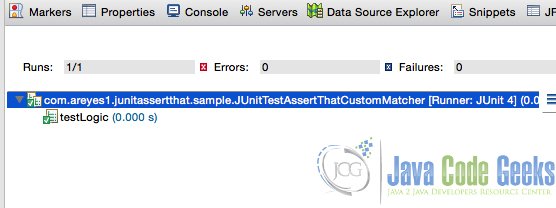JUnit AssertThat Example
1. Introduction
The assertThat is one of the JUnit methods from the Assert object that can be used to check if a specific value match to an expected one.
It primarily accepts 2 parameters. First one if the actual value and the second is a matcher object. It will then try to compare this two and returns a boolean result if its a match or not. Example of it’s usage as per below.
2. The Source Code
JUnitTestAssertThatAssertions.java
package com.areyes1.junitassertrue.sample;
import static org.junit.Assert.*;
import static org.hamcrest.CoreMatchers.*;
import org.junit.Before;
import org.junit.Test;
public class JUnitTestAssertThatAssertions {
int totalNumberOfApplicants = 0;
@Before
public void setData(){
this.totalNumberOfApplicants = 9;
}
@Test
public void testAssertThatEqual() {
assertThat("123",is("123"));
}
@Test
public void testAssertThatNotEqual() {
assertThat(totalNumberOfApplicants,is(123));
}
@Test
public void testAssertThatObject() {
assertThat("123",isA(String.class));
}
@Test
public void testAssertThatWMessage(){
assertThat("They are not equal!","123",is("1234"));
}
}
The example shown above uses is and isA method from the hamcrest core to return a matcher object given the value. This is then used by the assertThat method that will then return a boolean result of the comparison.
Here’s the output:
Aside from the example above, there are far more methods that can be used to rigorously test one’s code. JUnits own hamcrest api has incorporate core, logical and object methods for this purpose.
2.1 Core Matchers
Before you start implementing your own Matcher’s, you should look at the core matchers that come with JUnit already. Here is a list of the matcher methods:
Core
any()Matches any object passed to it.is()A matcher that checks if the given objects are equal.describedAs()adds a description to the matcher
Logical
allOf()Takes an array of matchers and must all match the expected object.anyOf()Takes an array of matcher and must match at least one of the matchers must report that it matches the target object.not()Check if the object negates what was passed.
Object
equalTo()Equality check.instanceOf()Check if an object is an instance of a given/expected object.notNullValue()Check if the passed value is not nullnullValue()Tests whether the given object is null or not null.sameInstance()Tests if the given object is the exact same instance as another.
The list above can all be used on assertThat method. It gives a wide range of possible scenarios to fully regress the extend of your algorithm, logic or processes of your application.
3. Bonus: Custom Matchers for your assertThat
You can actually create our own matcher and simply using that on your junit test case. See example of the custom matcher below.
CustomMatcher.java
package com.areyes1.junitassertthat.sample;
import org.hamcrest.BaseMatcher;
import org.hamcrest.Description;
import org.hamcrest.Matcher;
public class CustomMatcher {
public static Matcher matches(final Object expected){
return new BaseMatcher() {
protected Object expectedObject = expected;
public boolean matches(Object item) {
return expectedObject.equals(item);
}
public void describeTo(Description description) {
description.appendText(expectedObject.toString());
}
};
}
}
We can then use that matcher as part of our Junit Test source.
JUnitTestAssertThatCustomMatcher.java
package com.areyes1.junitassertthat.sample;
import static org.junit.Assert.*;
import static com.areyes1.junitassertthat.sample.CustomMatcher.*;
import static org.hamcrest.CoreMatchers.*;
import java.util.ArrayList;
import java.util.List;
import org.junit.Before;
import org.junit.Test;
public class JUnitTestAssertThatCustomMatcher {
ArrayList listOfValidStrings = new ArrayList();
private String inputValue = new String("Hello");
@Before
public void setData(){
listOfValidStrings.add("object_1");
listOfValidStrings.add("object_2");
listOfValidStrings.add("object_3");
}
@Test
public void testLogic(){
assertThat(inputValue,matches("Hello"));
}
}
Here’s the output:
4. Download the Eclipse project
This was an example of JUnit assertThat
You can download the full source code of this example here : junit-assertthat-example





